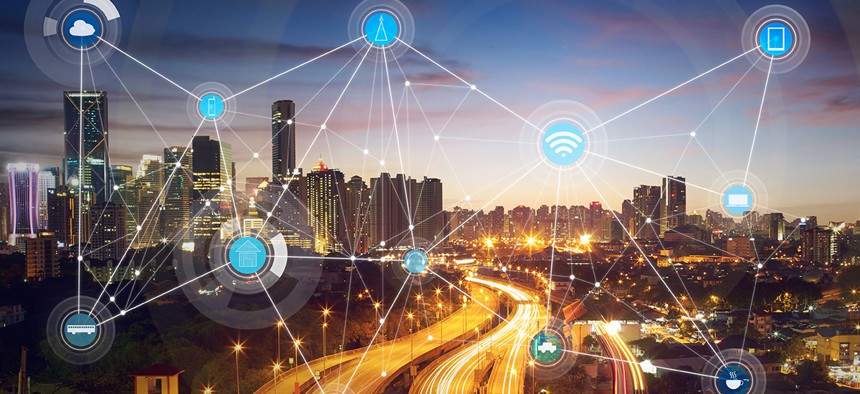Tech Companies Prep for Trump’s Infrastructure Plan—Even Without Details

jamesteohart/Shutterstock.com
Startups and blue-chip companies alike see potential business in Trump's promised infrastructure plan.
For the past few years, French entrepreneur Fabrice Brassart has been building what he thinks will be the backbone of the city of the future: a network of app-summoned self-driving cars that seamlessly navigate roads on a rubber pad lined with radio frequency identification tags.
It’s an ambitious project that’s still in the conceptual stage, at least a year from pilot deployment and four years from commercialization. Brassart is still raising funds in Europe for his Nice-based startup, REVA2, and already aims to use French cities Cagnes-sur-Mer and Rennes as testbeds—they have already expressed interest, he said. But he’s found a reason to pursue entering the American market as well: President Donald Trump’s campaign promise for a $1 trillion infrastructure spending plan, meted out over 10 years.
“We will harness technology and make smarter decisions on how we build and utilize our infrastructure,” Trump’s transition team wrote in a brief description of his plans. “Our roads, bridges, airports, transit systems and ports will be the envy of the world and enhance the lives of all Americans.”
» Get the best federal technology news and ideas delivered right to your inbox. Sign up here.
But details are sparse; it could potentially be fueled a combination of public and private dollars and a system of tax credits. By some estimates, the massive investment in infrastructure could create millions of jobs. Senate Democrats have proffered their own $1 trillion plan, which consists largely of federal investment in areas including roads and bridges, water and sewers, and broadband.
Despite uncertainty about what the spending bill could look like, executives at some tech companies—including at REVA2—view the discussions as a signal that American infrastructure could soon get an upgrade. For some companies, especially those focused on creating modern cities that are networks of self-driving cars, sensors embedded in traffic lights, and smart trash cans that never overflow, it may be an opportunity for tech companies to rebrand their offerings as infrastructure-related.
Brassart told Nextgov he “won’t wait” to start investigating how the French company could enter the American market, even though the plan hasn’t taken shape. “I just cannot afford it.” Though he expects to have a pilot by 2018, in anticipation of potential future contracts, he has started to contact connections in Washington to facilitate an expansion into the U.S. market.
It’s not just the startups. Blue chip tech companies including IBM are taking note of Trump’s plans. In an open letter to Trump first reported by CNBC, Chief Executive Officer Ginni Rometty—one of his business policy advisers—urged the newly elected president to “focus on infrastructure investments that incorporate Internet of Things (IoT) technology and artificial intelligence to improve performance,” which might include higher tech buildings and public facilities. Rometty also warned that smarter infrastructure increases cybersecurity concerns.
Cisco, an established federal contractor, may also reposition itself as a high-tech infrastructure company, Mark Sanders, the company’s director of Client & Market Development, told Nextgov.
In the past three years, the company has entered a handful of “sub-verticals” that could find a place in future cities, including water meters that, when coupled with sensors, allow people to monitor their water consumption remotely.
“We have done some select hiring to bring on expertise in transportation, specifically because we recognize that the country’s infrastructure is due for a major investment,” he said. Over the past few months, the company has also brought on civil engineers to help go after potential contracts. “Building our brand is critically important, because today many people think of Cisco as the networking company. Not necessarily do they think of them as the transportation company.”
With some public-sector customers, Cisco has started to conduct workshops that help customers prioritize their infrastructure investments, he said.
But for at least one young company, the specifics of the plan aren’t important. Daniel Shani, CEO and founder of a Boston-based startup that sells a product that, when laid on top of a road, generates energy when cars drive over it. Customers include parking garages that set the system up at slowdown points, potentially as a way to reduce their electricity spending.
Asked whether a robust infrastructure plan could persuade the company to more aggressively chase the federal market, Shani told Nextgov that his company will “absolutely be paying attention to it,” but that “it’s not taking us into any pivot or change in direction.”
The plan, whatever shape it takes, would take several years to implement, he said.
“From the lens of a startup, we are generally not looking too far out, so predictions only carry so much weight,” he said, though he added that it’s “very encouraging to feel there’s going to be support for domestic manufacturing, infrastructure [and] national security.”
More concrete discussions about infrastructure spending, and the opportunities it could provide for contractors, could emerge soon. During her confirmation hearing in mid-January, Transportation Secretary Elaine Chao said she would try to provide more details about plans in about 30 days.
“One of the major complaints is how long it takes for projects to be ready for bidding,” she said during that hearing. “So the issue is not only how to fund infrastructure projects, but how to increase the pipeline of available projects for all groups, private sector included, to be able to participate.”





